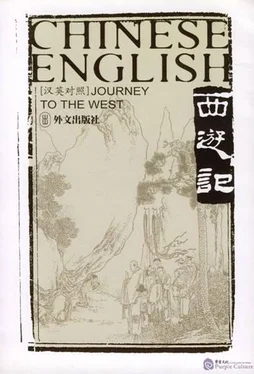When he was informed that work had been completed Taizong was very pleased, and assembling the multitude of officials he issued a notice summoning monks to come and hold a Great Mass for the rebirth of those lonely souls in the underworld. As the notice traveled throughout the empire the local officials everywhere recommended holy and venerable monks to go to Chang'an for the service. By the end of the month many monks had arrived in Chang'an from all over the empire. The Emperor issued a decree ordering Fu Yi, the Deputy Annalist, to select some venerable monks to perform Buddhist ceremonies. On hearing this command Fu Yi sent up a memorial requesting a ban on the building of pagodas and saying that there was no Buddha. It read:
By the Law of the West there are no distinctions between ruler and subject or between father and son; the Three Paths and the Six Roads are used to deceive the foolish; past sins are chased away to filch future blessings; and Sanskrit prayers are recited in attempts to avoid retribution. Now birth, death and the length of life are in fact decided by nature; and punishments, virtue, power and blessings come from the lord of men. But these days vulgar believers distort the truth and say that they all come from Buddha. In the time of the Five Emperors and Three Kings of antiquity this Buddha did not exist, yet rulers were enlightened, subjects were loyal, and prosperity lasted for many a long year. When foreign gods were first established in the time of Emperor Ming of the Han Dynasty, sramanas from the West began to propagate their religion. This is in reality a foreign encroachment on China, and it does not merit belief.
When he had heard this read to him Taizong tossed it to his other officials for debate. The minister Xiao Yu stepped forward from the ranks, kowtowed and said, “The Buddha's law has flourished for several dynasties, and by spreading good and preventing evil it gives unseen help to the state; there is no reason why it would be abolished. Buddha was a sage. Those who deny sages are lawless. I request that he be severely punished.” Fu Yi argued with Xiao Yu, pointing out that correct behavior was derived from serving one's parents and one's sovereign, whereas the Buddha turned his back on his parents, resisting the Son of Heaven although he was but a commoner, and rebelling against his mother and father with the body that they gave him. Xiao Yu had not been born in an empty mulberry tree, but he honoured a religion that denied fathers; this indeed proved that he who had no sense of filial piety denied his father.
All Xiao Yu did was to put his hands together and say, “Hell must have been made for men such as him.” Taizong sent for the High Chamberlain Zhang Daoyuan and the Head of the Secretariat Zhang Shiheng to ask them how effectively Buddhist ritual obtained blessings.
“The Buddha dwells in purity, benevolence and mercy,” the two officers replied, “and the True Result is Buddha-emptiness. Emperor Wu of the Northern Zhou Dynasty placed the Three Teachings in an order. The Chan Master Dahui wrote a poem in praise of the distant and mysterious. If the masses support monks, anything can happen. The Five Patriarchs came down to their mothers' wombs, and Bodhidharma appeared. From remotest antiquity everyone has said that the Three Teachings are highly venerable and cannot be destroyed or abolished. We humbly beg Your Majesty to give us his perceptive ruling.”
“Your submission makes sense,” said the delighted Taizong. “If anyone else makes further comments, he will be punished.” He then ordered Wei Zheng, Xiao Yu and Zhang Daoyuan to invite all the monks and select one of great virtue to be Master of Ceremonies. They all bowed to thank him and withdrew. From then on there was a new law: anyone who injured a monk or slandered the Buddha would lose his arm.
The next day the three court officials assembled all the monks at the altar among rivers and hills, and they went through them all one by one. From among them they chose a venerable and virtuous monk. Do you know who he was?
Fully versed in the basic mystery, his title was Golden Cicada;
But because he did not want to hear the Buddha preach
He transferred to the mortal world to suffer torment,
Was born among the common mortals to fall into the net.
From the moment he entered the womb he met with evil,
Before he left it he encountered a gang of villains.
His father was Top Graduate Chen from Haizhou,
His grandfather a senior imperial commander.
His birth offended the meteor that dropped into the water,
He drifted with the current and followed the waves.
Jinshan Island had a great destiny:
The abbot Qian'an brought him up.
Only at seventeen did he meet his mother,
And go to the capital to find his grandfather.
Commander Yin Kaishan, raising a great army,
Wiped out and punished the bandits at Hongzhou.
Graduate Chen Guangrui escaped from the heavenly net,
And father and son were happily reunited.
Accepting the invitation he receives once more the monarch's grace,
And his fame is spread as he climbs the lofty tower.
Refusing to take office he wants to be a monk,
So as sramana of the Hongfu Temple he learns about the Way,
The child of an ancient Buddha who used to be called Jiangliu,
And took the dharma-name of Chen Xuanzang.
That day the Reverend Xuanzang was chosen from among all the monks. He had been a monk from infancy, and ever since birth he had eaten vegetarian food and observed the prohibitions. His maternal grandfather was an imperial commander, Yin Kaishan. His father Chen Guangrui had come top in the Palace Examination and had been appointed a grand secretary in the Imperial Library. Xuanzang, however, had no interest in honour and glory, and his only joy was to cultivate Nirvana. Investigation revealed that his origins were good and his virtue great; of the thousand sutras and ten thousand holy books there was not a single one that he did not know; he could sing every Buddhist chant and knew all the religious music. The three officials took him to the imperial presence, where they danced and stirred up the dust. When they had bowed they reported, “Your subject Xiao Yu and the rest of us have chosen a venerable monk called Chen Xuanzang in obedience to the imperial decree.”
On hearing his name Taizong thought deeply for a long time and then asked, “Is that the Xuanzang who is the son of Grand Secretary Chen Guangrui?”
“Your subject is he,” replied Xuanzang with a kowtow.
“Then you were indeed well chosen,” said the Emperor with satisfaction. “You are indeed a monk of virtuous conduct of a mind devoted to meditation. I give you the offices of Left Controller of the Clergy, Right Controller of the Clergy, and Hierarch of the Empire.” Xuanzang kowtowed to express his thanks and accepted the appointments. The Emperor then gave him a multicolored golden cassock and a Vairocana miter, telling him to be sure he conscientiously continued to visit enlightened monks, and giving him the position at the top of the hierarchy. He gave him a decree in writing ordering him to go to the Huasheng Temple to pick a propitious day and hour on which to begin the recitations of the scriptures.
Xuanzang bowed, took the decree, and went to the Huasheng Temple where he assembled many monks, had meditation benches made, prepared for the mass, and chose the music. He selected a total of twelve hundred high and humble monks of enlightenment, who he divided into an upper, a middle and a lower hall. All the holy objects were neatly arranged before all the Buddhas. The third day of the ninth month of that year was chosen an auspicious day on which to start the seven times seven days of the Great Land and Water Mass. This was all reported to the throne, and at the appointed time Taizong, the high civil and military officials, and the royal family went to the service to burn incense and listen to the preaching. There is a poem to prove it that goes:
Читать дальше









